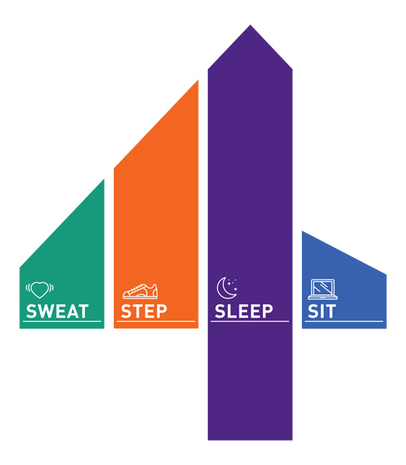Adequate sleep improves mood, attention, learning, motivation and memory. It also improves general health and quality of life. Adequate sleep improves youth's success at school. Lack of sleep among children and adolescents can trigger negative health consequences. For example, it increases the risk of developing type 2 diabetes, obesity, anxiety and depression.
|
Canadian Daily Sleep Guidelines: Children and Youth A healthy 24 hours includes physical activity, sedentary behaviour, healthy eating, and sleep: Sleep Well
|
TIPS FOR FAMILIES:
Preparing for sleep
- Create a relaxing bedtime routine. Chose relaxing and enjoyable activities. Repeat those activities every night, in the same order. Routine creates a pattern that the brain recognizes and links with sleep.
- Have consistent bedtime and wake up time. Try to not change it too much on the weekend.
- Children & teens tend to imitate their parents when it comes to sleep. Having good habits for the whole family can guide them towards good sleep habits.
- Turn off all electronic devices 30 minutes before bedtime . Electronic devices emit blue light, which has been shown to reduce or delay the production of melatonin in the evening. Melatonin is the hormone that makes you feel sleepy. Blue light has also shown to have an impact on sleep stages. Overall, blue light at night decreases sleep quantity and quality.
- Avoid bright lights close to bedtime.
- Avoid stressful tasks (homework, chores, etc.) close to bedtime. Having at least 30 minutes to relax at the end of the day gets you in the right mood for sleep.
- Avoid eating a large meal or sugary treats close to bedtime.
- Remove televisions, cellphones and computers from the bedroom.
- Try to have a quiet bedroom. If it is not possible, try ear plugs or even a fan to drown out other sounds.
- Create a good environment. Try to make the bedroom comfortable, dark and with a cool temperature.
- Restrict in-bed activity. Yes, your bed is comfortable, and it can be tempting to lie on it to do some homework, play on your phone, etc. It is however better not to do so. It is good to build a link in your mind between sleep and being in bed.
- Get daily exposure to sunlight, especially in the morning. It helps to have a good sleep schedule.
- Get your daily physical activity. It helps to improve good quality sleep. For more information, see our movement section.

